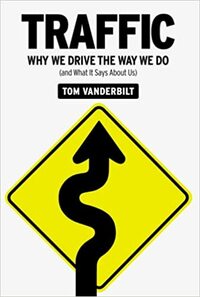Take a photo of a barcode or cover
Pretty cool!
This is a relatively long book so I'll just summarize: Once we get behind the wheel and reach speeds above 20mph, we become complete psychopaths.
This is a relatively long book so I'll just summarize: Once we get behind the wheel and reach speeds above 20mph, we become complete psychopaths.
An accessible and interesting, yet detailed look at a number of traffic issues that we all suffer through, wonder about, but poorly understand. It's not a book with mind-blowing solutions, but it is very good at identifying traffic challenges and the role that humans play in creating and exacerbating them. Sometimes, understanding what causes the challenges is enough to keep your blood pressure at a reasonable level when you're suffering through them. You may also identify things you are contributing to and identify ways to be a better participant on the roads.
Surprisingly interesting. Things we think about traffic are usually pretty wrong. Who knew there would be so many traffic analysts in the world. LOL.
Wow. So extremely fascinating, but not because of anything enlightening about traffic (except the squareabout in the Netherlands:

Read more about it at https://thinkbicyclingblog.wordpress.com/2013/06/13/hans-mondermans-people-friendly-dutch-squareabout/)
Honestly, the highlights of the book were all in the "and What It Says About Us" parts. The analysis of why we drive the way we do is rooted so much in psychology, sociology, culture norms, social evolution, etc. I love the way that all the driving phenomena tie back into the way the world works on a very general level (GDP, corruption, and traffic fatalities all intermingle?). Though I may not have learned any tips to avoid getting stuck in traffic (or, as Vanderbilt more accurately states, be a part of traffic), I read this book much more as a reflection on the human population, which I think is a much more rewarding perspective.
On a sidenote, reading this in2016 2017 (!), I love having the gift of hindsight in some of these predictions or ponderings from when Vanderbilt published this book in 2008. Though most of what is written is still valid today, comments like "the emergence of the iPod" alert me to the rapidly changing environment thanks to technology.

Read more about it at https://thinkbicyclingblog.wordpress.com/2013/06/13/hans-mondermans-people-friendly-dutch-squareabout/)
Honestly, the highlights of the book were all in the "and What It Says About Us" parts. The analysis of why we drive the way we do is rooted so much in psychology, sociology, culture norms, social evolution, etc. I love the way that all the driving phenomena tie back into the way the world works on a very general level (GDP, corruption, and traffic fatalities all intermingle?). Though I may not have learned any tips to avoid getting stuck in traffic (or, as Vanderbilt more accurately states, be a part of traffic), I read this book much more as a reflection on the human population, which I think is a much more rewarding perspective.
On a sidenote, reading this in
informative
fast-paced
challenging
informative
slow-paced
Very interesting, but not the type of book you sit down and read like a novel. Little tidbits here and there!
As a transportation planner, it was fun to hear all the basics presented back in different perspectives.
Interesting enough, but I wish the author had more guts. He's pretty extreme on the "every saved life is worth additional regulation" bandwagon, but never gets around to making such bold statements. Instead, I assume he thinks the statistics are strong enough on their own on such things as cell phone and radio use, age of drivers, and amount of signage on roads being a distraction rather than a help. That's nice and all, but he seems to idolize the European model of overregulation without making the argument as to how protecting people from themselves is a valid concern of government power. Not a bad read, but not for everyone.







